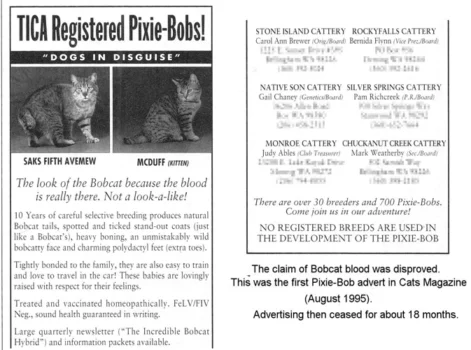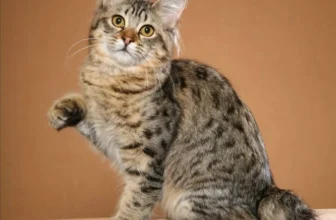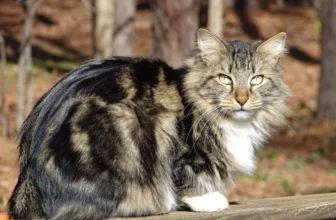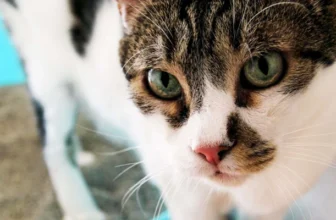Have you recently adopted an American Bobtail Cat or are you considering getting one? As an owner, it is natural to worry about their health and wellbeing. One way to ensure they live a long and healthy life is to have them undergo genetic testing. Genetic testing for American Bobtail Cats has become increasingly important in recent years and can help detect early signs of health issues. In this article, we will discuss the available genetic tests for American Bobtail Cats including Hypertrophic Cardiomyopathy (HCM), Polycystic Kidney Disease (PKD), Spinal Muscular Atrophy (SMA), Pra-b, and Blood Type. We will also explore the benefits of genetic testing and how to get your American Bobtail Cat tested.
The Basics
American Bobtail cats are one of the most popular cat breeds in the United States. They are unique, intelligent and have a friendly disposition. However, like any other breed, American Bobtails can be prone to genetic disorders. These disorders are caused by mutations in their genes and can lead to severe health problems if left undetected.
What are genetic disorders?
Genetic disorders refer to diseases or abnormalities that are caused by a faulty gene or a group of genes. These disorders can be inherited from either parent, and they can affect any part of the body.
How are American Bobtail Cats Affected by Genetic Disorders?
American Bobtail cats are susceptible to several genetic disorders. Some of the most common disorders include Hypertrophic Cardiomyopathy (HCM), Polycystic Kidney Disease (PKD), Spinal Muscular Atrophy (SMA), Pra-b and Blood Type.
HCM is the most common disease that affects American Bobtail cats. This disease causes the thickening of the heart muscle, which can lead to heart failure. PKD is another genetic disorder that causes the formation of cysts in the kidneys. This disorder can lead to kidney failure if left untreated.
SMA is a rare genetic disorder that affects the muscles in the body. It can cause muscle weakness and wasting, making it difficult for cats to move around. Pra-b is a type of progressive blindness that can affect American Bobtails.
Blood type is also a crucial genetic trait that American Bobtail cats have. This breed has two blood types, type A and type B. If a type B American Bobtail cat mates with a type A American Bobtail cat, it can lead to severe neonatal isoerythrolysis (NI).
Why is Genetic Testing Important?
Genetic testing is essential for American Bobtail cats because it helps in early detection of genetic disorders. Early detection makes it easier for veterinarians to manage the disease and prevent it from progressing to more severe health problems. Genetic testing is also important for managing breeding programs for American Bobtail cats.
By carrying out testing, breeders can determine whether a cat has any genetic disorders and decide whether to breed it or not. Responsible breeding that accounts for genetics can greatly reduce the prevalence of genetic disorders in American Bobtail cats.
How to Manage Genetic Disorders in American Bobtail Cats?
There are different ways of managing genetic disorders in American Bobtail cats. One of the best ways to manage these disorders is to have a thorough understanding of the breed’s genetics. By understanding the breed’s genetics, it is possible to breed selectively and reduce the incidence of genetic disorders.
Another way of managing genetic disorders is through genetic testing. Genetic testing allows breeders to identify genetic disorders early on and take necessary steps to prevent them. Regular health checkups for American Bobtail cats can also help in early detection of genetic disorders.
As a cat owner, it is important to know about the genetic disorders that can affect American Bobtail cats. Genetic testing is essential in detecting these disorders early on and managing them effectively. Responsible breeding practices can greatly reduce the prevalence of genetic disorders in the breed.
Why Genetic Testing is Important
Genetic Testing is Important for American Bobtail Cats
Genetic testing is the process of examining an animal’s DNA to identify any genetic disorders it may have. Testing for genetic disorders is important for American Bobtail cats because it enables owners and breeders to identify any health issues that the cat may have, allowing for appropriate medical attention and treatment. Additionally, genetic testing can be instrumental in responsible breeding to ensure that offspring do not inherit any genetic disorders, which can be costly to treat and may result in a reduced quality of life for the cat.
Identifying Potential Health Risks
One of the primary reasons why genetic testing is important for American Bobtail cats is that it allows for early identification of potential health risks. By identifying a genetic disorder early on, owners and breeders can take necessary steps to prevent the disorder from worsening or causing additional health problems for the cat. Additionally, early detection of genetic conditions can enable veterinarians to provide appropriate treatment and management plans to help improve the cat’s quality of life.
Responsible Breeding Practices
Genetic testing is also an essential component of responsible breeding practices for American Bobtail cats. By testing breeding cats for specific genetic disorders, breeders can prevent the passing down of genetic disorders to future generations of cats. This not only helps maintain the health and wellbeing of the cats, but it also helps to sustain the breed over the long term. Breeding cats that have tested negative for genetic disorders helps to prevent the occurrence of common genetic disorders, which can be costly to treat and may cause pain and suffering to the cat.
Genetic testing is a crucial aspect of managing the health and wellbeing of American Bobtail cats. The testing process enables veterinarians, breeders, and cat owners to identify potential genetic disorders and take appropriate action to manage or prevent them. By engaging in responsible breeding practices and testing breeding cats for genetic disorders, cat lovers can help sustain the breed over the long term while also reducing the risk of costly and painful genetic disorders.
Available Genetic Tests for American Bobtail Cats
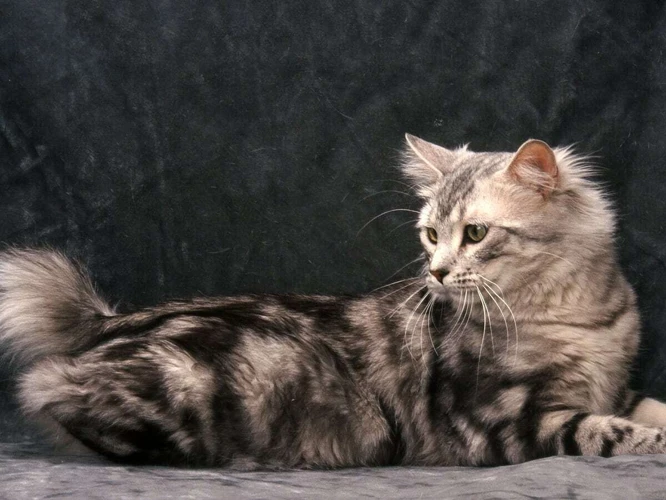
Genetic testing is essential in ensuring the health and well-being of your American Bobtail cat. There are several tests available that can detect genetic mutations that may cause various health issues in your feline companion.
Hypertrophic Cardiomyopathy (HCM): This is a common genetic heart disease in American Bobtail cats that can lead to heart failure. A genetic test is available that can detect the mutation responsible for HCM. This test is usually recommended for American Bobtail cats who are used for breeding to prevent the spread of this mutation to future generations.
Polycystic Kidney Disease (PKD): This is a genetic disease that causes the formation of fluid-filled cysts in the kidneys, which can lead to kidney failure. PKD is common in American Bobtail cats, and a genetic test can detect the mutation that causes this disease. It’s highly recommended to test breeding cats for PKD to prevent the spread of this mutation to future generations.
Spinal Muscular Atrophy (SMA): This is a rare genetic neuromuscular disorder that affects the nerves controlling muscle movement. A genetic test can check for the presence of this mutation. Although SMA is rare in American Bobtail cats, it’s important to detect it early to provide appropriate care and prevent the spread of this genetic mutation.
Pra-b: Progressive Retinal Atrophy type B is a genetic disorder that causes a degenerative condition affecting the retina in American Bobtail cats. A genetic test is available to detect the mutation responsible for PRA-B, which can help prevent blindness and provide early treatment.
Blood Type: A blood test is required to determine the blood type of your American Bobtail cat. There are three blood types: A, B, and AB. Knowing the blood type of your cat is essential in case of blood transfusions, as transfusing the wrong blood type can have fatal consequences.
It’s crucial to be aware of the genetic health issues that may affect your American Bobtail cat. Regular genetic testing can help detect mutations responsible for these diseases. By identifying these mutations, responsible breeders can avoid breeding cats with known genetic disorders and prevent the spread of these mutations to future generations.
If you want to learn more, check out these related articles:
Genetic Disorders in American Bobtail Cats
How to Avoid Genetic Disorders in American Bobtail Cats
The Importance of Responsible Breeding to Prevent Genetic Disorders in American Bobtail Cats
Managing Genetic Disorders in American Bobtail Cats
Hypertrophic Cardiomyopathy (HCM)
Hypertrophic Cardiomyopathy (HCM) is a common genetic disorder found in American Bobtail cats. It is a condition where the walls of the heart become thick, making it harder for the heart to pump blood effectively. Symptoms of HCM in American Bobtail cats include difficulty breathing, lethargy, poor appetite, and even sudden death.
What Causes HCM in American Bobtail Cats?
HCM is caused by mutations in the genes responsible for the structure of the heart muscle in American Bobtail cats. There are several genes that can contribute to the development of HCM, and each cat can have a different combination of mutations. HCM is an inheritable disorder, which means that it can be passed down from one generation to the next.
How is HCM Diagnosed in American Bobtail Cats?
Genetic testing is the most effective way to diagnose HCM in American Bobtail cats. There are several DNA-based genetic tests available that can identify the mutations associated with HCM. The tests can determine whether a cat is clear of HCM, is a carrier of the gene, or has the disease. As HCM is a progressive disease, early detection is important to help manage the condition and prolong the cat’s life.
How Can HCM be Managed in American Bobtail Cats?
There is no cure for HCM, but there are ways to manage the condition and improve the cat’s quality of life. Treatment options may include medication to help manage heart function and surgery to remove excess fluid from around the heart. It is also important to have regular check-ups with a veterinarian who is experienced in treating cats with HCM.
The Importance of Genetic Testing for HCM in American Bobtail Cats
Genetic testing for HCM in American Bobtail cats is crucial for several reasons. Firstly, it can help identify affected cats before symptoms occur, allowing for early intervention and management. Secondly, it can help breeders make informed decisions about mating pairs to reduce the occurrence of HCM in future generations. Lastly, it can give cat owners peace of mind by ensuring that they are providing the best care possible for their furry companions.
Genetic testing for HCM and other genetic disorders in American Bobtail cats is an important step in ensuring the health and wellbeing of these beloved feline companions. If you want to learn more about genetic disorders in American Bobtail cats, check out our article on common genetic disorders in American Bobtail cats.
Polycystic Kidney Disease (PKD)
Polycystic Kidney Disease (PKD) is a genetic disorder that affects American Bobtail cats. The disease is characterized by the formation of cysts in the kidneys, which can eventually lead to kidney failure if left untreated. Early detection is crucial in managing PKD, as the disease is not curable.
Symptoms of PKD in American Bobtail Cats
American Bobtail cats with PKD may not show any symptoms in the early stages of the disease. However, as the cysts grow in size and number, the following symptoms may start to appear:
1. Increased thirst and urination
2. Loss of appetite
3. Weight loss
4. Vomiting
5. Lethargy
6. Blood in urine
7. Painful urination
8. Poor coat condition
If your American Bobtail cat starts exhibiting any of these symptoms, it is important to take them to a veterinarian for a proper diagnosis.
How is PKD in American Bobtail Cats Diagnosed?
PKD can be diagnosed through ultrasound, which can detect the cysts in the kidneys. The test can be performed on cats as young as six to eight months old, which is why early testing is recommended for American Bobtail cats.
Why is Genetic Testing Important for PKD in American Bobtail Cats?
Genetic testing is essential in preventing the spread of PKD among American Bobtail cats. Because it is a genetic disorder, cats with PKD should not be bred. Additionally, carriers of the disease should only be bred to cats that have tested negative for the disease.
Identifying carriers of PKD through genetic testing can help prevent the disease from being passed on to future generations of American Bobtail cats. It can also help breeders make informed decisions about which cats to include in their breeding programs.
What is the Treatment for PKD in American Bobtail Cats?
Unfortunately, there is no cure for PKD in American Bobtail cats. Treatment involves managing the symptoms and slowing the progression of the disease. This can be done through medication, diet, and monitoring the cat’s kidney function through regular blood and urine tests.
In some cases, a kidney transplant may be an option for cats with PKD. However, this is a complex procedure that can be costly and may not be feasible for every cat.
Conclusion
PKD is a serious genetic disorder that can affect American Bobtail cats. Early detection through genetic testing is essential in managing the disease and preventing it from being passed on to future generations of cats. If you suspect your American Bobtail cat may have PKD, it is important to seek veterinary care as soon as possible.
Spinal Muscular Atrophy (SMA)
Spinal Muscular Atrophy (SMA) is a genetic condition that affects the motor neurons in the spinal cord, which ultimately leads to muscle weakness and atrophy. This condition is caused by a deficiency in the SMN1 gene, which is responsible for producing the survival motor neuron (SMN) protein. Without sufficient levels of SMN, the motor neurons that control muscle movements deteriorate, causing muscle weakness and ultimately leading to loss of function.
SMA is a well-known genetic disease that affects many different breeds of cats, including the American Bobtail. This condition can present itself in different ways depending on the severity of the disease, with some cats experiencing mild muscle weakness and others being unable to move at all.
With advancements in genetic testing, it is now possible to detect and diagnose SMA in cats before symptoms develop. This is particularly important for breeding programs, as carriers of the SMN1 gene can unknowingly pass on the condition to their offspring. By testing breeding cats for SMA, breeders can make informed decisions about which cats to breed, reducing the risk of passing on the disease.
Testing for SMA can be done through a variety of methods, including blood tests, cheek swabs, and DNA tests. These tests are often conducted by specialized laboratories that focus on feline genetics. The testing process is relatively straightforward and involves analyzing the cat’s DNA for the presence of the SMN1 gene.
While the cost of genetic testing for SMA varies depending on the testing method and laboratory used, it is generally affordable for most cat owners. The benefits of testing for SMA far outweigh the costs, as early detection can help cat owners and breeders make informed decisions about their cat’s health and prevent the passing on of the condition to future generations.
Genetic testing for Spinal Muscular Atrophy is an important aspect of responsible cat ownership, particularly for those owning or breeding American Bobtail cats. Testing can help identify carriers of the disease, prevent it from being passed on to future generations, and ultimately improve the health and well-being of these beloved feline companions.
Pra-b
One of the available genetic tests for American Bobtail cats is the Pra-b test. Pra-b stands for Progressive Retinal Atrophy, which is a group of genetic diseases that cause the degeneration of the retina, leading to blindness. The Pra-b test is specifically designed to detect a mutation in the CEP290 gene that is responsible for one type of Progressive Retinal Atrophy in American Bobtail cats.
Progressive Retinal Atrophy is a hereditary disease that affects many dog and cat breeds. It is important to test for Pra-b, as it is a known issue in the American Bobtail breed. This test is particularly significant, as the mutation can be present in cats that do not show any symptoms of the disease. Early detection can help cat owners and breeders make informed decisions about their cat’s health and future breeding plans.
The Pra-b test requires a DNA sample, which can be easily collected through a non-invasive cheek swab at home or at a veterinary clinic. The sample is then sent to a testing center where the DNA is analyzed for the presence of the CEP290 mutation.
It is important to note that even if a cat is identified as having the Pra-b mutation, it does not necessarily mean that it will develop the disease. It is possible for a cat to carry the mutation but never show any symptoms. This is why testing is significant, as it can help breeders identify carriers and avoid breeding them with other carriers or affected cats. By doing so, it can reduce the likelihood of the disease being passed down to future generations.
The Pra-b test is a valuable tool for cat owners and breeders alike in ensuring the health and well-being of American Bobtail cats. By identifying the presence of the CEP290 mutation, cat owners can make informed decisions about their cat’s health care and breeding plans, ultimately leading to healthier and happier cats.
Blood Type
One of the genetic tests available for American Bobtail cats is for blood type. Just as with humans, cats can have different blood types, and knowing your American Bobtail’s blood type can be important in certain situations.
Importance of Blood Typing
Blood typing is important because in the event of an emergency, your American Bobtail may require a blood transfusion. However, not all blood types are identical, and transfusing the wrong type of blood can be fatal. Knowing your cat’s blood type can be critical in the event that they need a transfusion.
Blood Type Compatibility
There are three different blood types in cats: A, B, and AB. Type A is the most common, found in around 99% of cats, while type B is much rarer, present in only about 1% of cats. AB blood is also rare, found in only about 3% of all cats. It’s important to know which blood type your American Bobtail has so you can find a compatible donor should the need arise.
Testing for Blood Type
Blood type testing is generally done through a simple blood test that can be performed by your veterinarian. The test involves taking a small sample of blood from your American Bobtail and determining their blood type through a series of diagnostic tools. The process is quick and painless, and the results can be obtained within a few days.
Conclusion
Knowing your American Bobtail’s blood type can be important in emergency situations, and it’s always better to be prepared. If you’re unsure of your cat’s blood type, consider having them tested during your next veterinarian visit. By doing so, you can better protect your American Bobtail’s health should an emergency arise.
Benefits of Genetic Testing for American Bobtail Cats
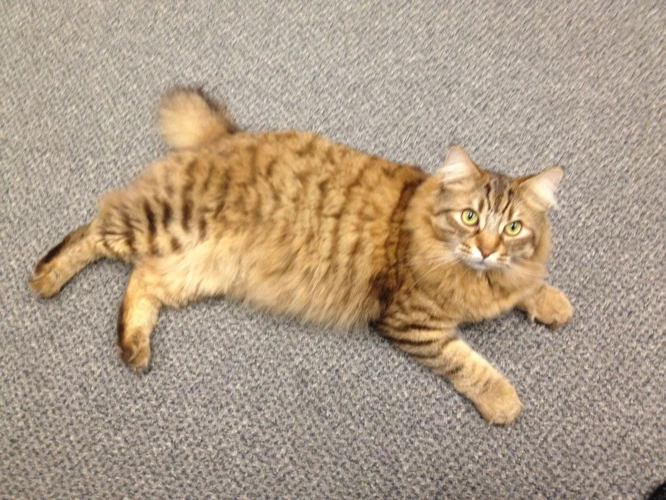
Genetic testing for American Bobtail cats offers various benefits that cannot be overlooked by pet owners or breeders. Some of the most significant advantages of genetic testing for these cats are discussed below:
Early Detection of Health Issues: One of the most important benefits of genetic testing is the ability to detect health issues at an early stage. By identifying problems such as HCM, PKD, SMA, and Pra-b, breeders can take proactive steps to manage and minimize their impact. Early detection and management of these problems can significantly improve the overall health and well-being of the cats.
Breeding Programs: Genetic testing is particularly important for breeders as it enables them to select the healthiest and most genetically sound cats for their breeding programs. By identifying carriers of genetic diseases, breeders can make informed decisions about which cats to include in their breeding programs, thus reducing the risk of producing offspring with such diseases. This can lead to healthier and stronger bloodlines, and ultimately improve the overall health and quality of the breed.
Improved Peace of Mind: Genetic testing offers peace of mind to pet owners and breeders. Knowing that their cats have been tested for genetic diseases can alleviate concerns and reassure them that they are doing the best they can to ensure their cats’ health and well-being.
Reduced Veterinary Costs: Genetic testing can help reduce veterinary costs over time by identifying potential health problems early. This allows for timely intervention and management, which can avoid more expensive treatments in the future.
Genetic testing for American Bobtail cats offers many benefits, including early detection of health issues, improved breeding programs, peace of mind, and potentially reduced veterinary costs. Pet owners and breeders should consider genetic testing as an essential tool for ensuring the health and well-being of their cats.
Early Detection of Health Issues
Early detection of health issues is crucial when it comes to ensuring your American Bobtail cat enjoys a long and healthy life. Genetic testing can provide a wealth of information about your cat’s health, enabling you to take proactive measures to prevent or mitigate any issues that may arise.
One major benefit of genetic testing is the ability to identify potential health issues before symptoms appear. Many genetic conditions are asymptomatic in the early stages, meaning that you might not even realize your cat is sick until the condition has progressed to a more advanced stage. With genetic testing, however, you can get an early warning of potential issues and take steps to prevent or manage them before they become serious.
Genetic testing can also help you develop a customized healthcare plan tailored to your cat’s individual needs. Once you know which conditions your cat may be at risk for, you can work with your veterinarian to develop a preventive care plan to keep your cat healthy. This plan may include dietary adjustments, regular check-ups, and other interventions designed to reduce the risk of developing certain conditions.
Knowing your cat’s genetic profile can also help you avoid unnecessary or invasive medical procedures. For example, if your cat is prone to certain conditions, you can avoid medications or treatments that may exacerbate the problem. Additionally, if your cat does need to undergo a procedure or treatment, you can work with your vet to choose the least invasive and most effective option.
In short, genetic testing offers a powerful tool for ensuring your American Bobtail cat stays healthy and happy. By identifying potential health issues early on, developing customized healthcare plans, and choosing the right treatments, you can give your cat the best possible chance for a long and healthy life.
Breeding Programs
One of the biggest benefits of genetic testing for American Bobtail cats is the role it can play in improving breeding programs. By testing breeding cats for genetic diseases and conditions, breeders can gain a better understanding of their cat’s health status and make informed decisions about breeding. This can help to reduce the incidence of genetic diseases in the breed and promote overall cat health.
Through genetic testing, breeders can identify cats that carry harmful mutations and ensure they are not used for breeding. By doing so, they can avoid passing on these mutations to future generations and protect the health of the breed. Genetic testing can also identify cats that do not carry any mutations for a particular disease or condition, making them good candidates for breeding.
Good breeding programs require careful planning and management, and genetic testing is an essential component of this process. By testing American Bobtail cats and using this information to make informed breeding decisions, breeders can create healthy, genetically diverse populations of cats that meet their breed standards.
Genetic testing helps breeders to improve the health and welfare of their cats, and ensures that future generations of American Bobtail cats are healthy, happy and vibrant. By being informed about the genetic traits of their breeding cats, breeders can make better decisions about which cats to breed together, creating healthy, genetically diverse populations that will be enjoyed by owners and breeders alike.
How to Get Your American Bobtail Cat Tested
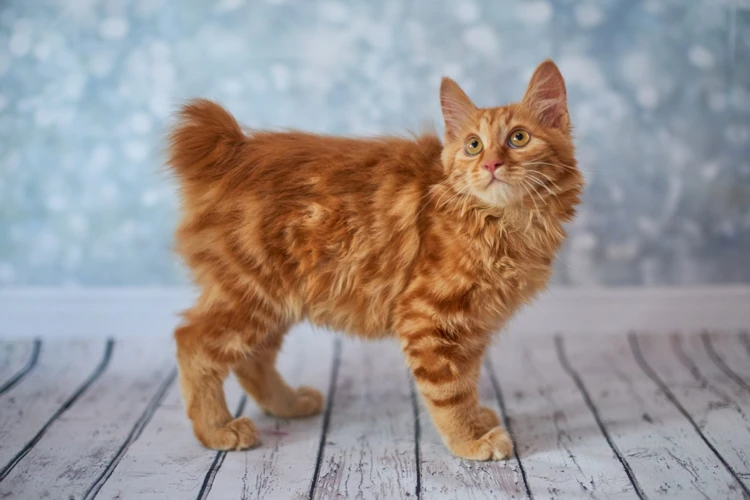
If you own an American Bobtail cat and want to get them genetically tested, there are a few steps you’ll need to take. Firstly, it’s important to research your options to find a reputable genetic testing center.
Research Testing Centers: Look for testing centers that specialize in feline genetics and have a good reputation in the industry. You can start your search by asking your veterinarian for recommendations or by conducting an online search for genetic testing centers that specifically offer tests for American Bobtail cats.
Contact Testing Center: Once you have a few testing centers in mind, contact each center and inquire about the specific tests they offer for American Bobtail cats. During this initial conversation, you’ll also want to ask about the cost of the testing as well as any requirements you’ll need to fulfill prior to the appointment.
Prepare for the Appointment: Prior to your appointment, you’ll need to prepare for the arrival of your American Bobtail cat. Make sure they are up-to-date on all their shots and vaccinations, and have clean fur and nails. You may also need to fast your cat for a certain period of time before the appointment, depending on the specific test being administered.
The Testing Process: Each testing center may have a slightly different process, but generally speaking, the technician will take a small sample of blood or tissue to be sent to a lab for analysis. Depending on the test being administered, it may take several days or even weeks to receive the results.
Understanding the Results: Once the test results come back, you’ll want to schedule a follow-up appointment with your veterinarian to go over the results of the test. They can help explain what the results mean for your cat’s health and what steps to take next, if any.
The process of getting your American Bobtail cat genetically tested may seem daunting, but it’s an important step in keeping your cat healthy and ensuring that you are aware of any potential health issues. By following these steps and doing your research, you’ll be able to find a reputable testing center and ensure that the testing process goes smoothly.
Testing Centers
When it comes to genetic testing for American Bobtail Cats, there are several testing centers that offer these services. These testing centers have the necessary equipment and expertise to perform genetic testing on cats and provide accurate results.
Genetic Testing Laboratories is one of the most well-known testing centers for genetic testing in cats. They offer testing for several genetic diseases in American Bobtail Cats, including HCM, PKD, SMA, and more. They use state-of-the-art technology and have a team of qualified scientists and technicians to ensure accurate and reliable results.
The University of California, Davis is another reputable testing center for American Bobtail Cats. They offer a wide range of genetic testing services, including tests for blood type and several genetic diseases. Their laboratory is equipped with the latest technology, and they have a team of experts who are passionate about animal health.
The Animal Health Diagnostic Center at Cornell University is yet another reliable testing center for genetic testing in cats. They offer testing for various genetic diseases, and their laboratory is staffed with experienced scientists who specialize in animal health. They also offer counseling services for cat owners who may have questions or concerns about the test results.
Veterinary clinics and hospitals may also offer genetic testing services for American Bobtail Cats. However, it is essential to ensure that the clinic or hospital has the necessary equipment and trained personnel to perform genetic testing accurately.
Before choosing a testing center for your American Bobtail Cat, it is crucial to do your research and find a reputable and reliable center. Make sure that the testing center uses state-of-the-art technology and has a team of experienced scientists and technicians. Additionally, it is essential to consider the cost of testing, as some centers may charge more than others.
The Testing Process
When it comes to the testing process for genetic testing of American Bobtail cats, it is important to first understand the testing methodology. The testing process involves taking a DNA sample, which can be done with a cheek swab or blood sample.
Cheek Swab Test: A cheek swab test involves taking a sample of cells from the inside of your cat’s cheek using a cotton-tipped swab. This process is usually quick and easy, and can be performed in the comfort of your home or at a veterinarian’s office.
Blood Test: Alternatively, a blood sample can be taken from your cat for genetic testing. This method is usually more accurate than a cheek swab test for certain genetic conditions, such as blood type, and it is also ideal for kittens who have not yet developed their permanent teeth.
Once the sample has been collected, it is sent to a laboratory for analysis. The laboratory technicians will analyze the sample to identify any genetic mutations that may be present in your cat’s DNA. The results of the genetic test will be sent to you in a report.
It is important to note that not all genetic tests are created equal. Some genetic tests may have a higher sensitivity and specificity than others. Sensitivity refers to the ability of the test to correctly identify those who have the disease (true positives), while specificity refers to the ability of the test to correctly identify those who do not have the disease (true negatives).
Some genetic tests may be more useful than others depending on your cat’s breed and family history. For example, some genetic tests may be more appropriate for American Bobtail cats than others, depending on the prevalence of certain genetic conditions within the breed.
The testing process for genetic testing of American Bobtail cats is a relatively easy procedure that can provide important insights into your cat’s health status. Genetic testing can help identify potential health concerns early on, allowing for timely intervention and treatment.
Costs of Genetic Testing for American Bobtail Cats
Genetic testing for American Bobtail Cats is a crucial step in ensuring that your feline companion lives a long and healthy life. However, with any medical procedure comes the question of costs. The costs of genetic testing for American Bobtail Cats can vary depending on the type of test and the location where the test is performed.
Hypertrophic Cardiomyopathy (HCM) testing can cost anywhere from $100 to $400, depending on the laboratory performing the test. This is usually a one-time cost, as the test only needs to be performed once to determine if your cat carries the HCM gene.
Polycystic Kidney Disease (PKD) testing typically costs around $50 to $150. However, some laboratories may charge up to $300 for this test. This is also usually a one-time cost.
Spinal Muscular Atrophy (SMA) testing can vary in cost depending on the laboratory. Prices range from $50 to $250. Similar to HCM and PKD testing, this is generally a one-time cost.
Pra-b testing, which determines whether or not your American Bobtail Cat carries a specific gene related to PRA (progressive retinal atrophy), can cost anywhere from $75 to $125.
Blood Type testing is another important genetic test for American Bobtail Cats, and can be done for around $50 to $100. This test does not need to be performed as frequently as genetic tests for health conditions, as the blood type of your cat does not usually change.
It is important to note that the costs of genetic testing for American Bobtail Cats may be higher if you choose a laboratory outside of your local area or if your veterinarian sends the test to a specific laboratory. Additionally, some veterinary clinics may charge a fee for drawing blood or administering the test.
Although the costs may seem high, it is important to remember that genetic testing can help detect potential health issues early on, potentially saving you money in the long run by avoiding costly medical treatments for conditions that could have been prevented or managed with early intervention. Additionally, if you plan on breeding your American Bobtail Cat, genetic testing can help ensure that you are breeding healthy cats and not passing on any potentially harmful genes to future generations.
The costs of genetic testing for American Bobtail Cats may vary depending on the type of test and the laboratory performing the test. However, the benefits of genetic testing far outweigh the costs, as it can help detect potential health issues early on and promote responsible breeding practices.
Conclusion
In conclusion, genetic testing is an essential step for maintaining the health and well-being of American Bobtail cats. Through screening for common genetic disorders such as HCM, PKD, SMA, and Pra-b, owners can ensure early detection and treatment of any potential health issues. By identifying cats that carry these genetic mutations, breeders can make informed decisions about their breeding programs and prevent passing these disorders down to future generations.
While the cost of genetic testing may seem daunting at first, it is a worthwhile investment in the long-term health of these beloved pets. Owners can find testing centers and labs that offer these services, and the process is relatively straightforward.
In addition to preventing health issues, genetic testing can also provide peace of mind for pet owners. With the knowledge that their American Bobtail cat is in good health and not predisposed to any genetic disorders, owners can rest easy knowing they’re doing everything they can to ensure their furry friend leads a healthy and fulfilling life.
In the end, genetic testing is just one aspect of responsible pet ownership, but it is an important one. By taking this step, owners can rest easy knowing they’re doing everything they can to ensure the long-term health and happiness of their American Bobtail cat.
Frequently Asked Questions
What is Genetic Testing?
Genetic testing is a type of medical test that identifies changes in a person’s chromosomes, genes, or proteins. It can help diagnose or predict the likelihood of inherited diseases or genetic disorders in individuals.
What is Hypertrophic Cardiomyopathy (HCM)?
Hypertrophic Cardiomyopathy (HCM) is an inherited disease that affects the heart muscle. It causes thickening of the heart muscle and can lead to heart failure, blood clots, and sudden death in American Bobtail cats.
What is Polycystic Kidney Disease (PKD)?
Polycystic Kidney Disease (PKD) is a genetic disorder that causes cysts to form in the kidneys of American Bobtail cats. These cysts can lead to kidney failure, high blood pressure, and other health problems.
What is Spinal Muscular Atrophy (SMA)?
Spinal Muscular Atrophy (SMA) is a genetic disorder that affects the muscles used for movement. It can cause muscle weakness, difficulty breathing, and other health problems in American Bobtail cats.
What is Pra-b?
Pra-b is a genetic test that identifies if American Bobtail cats are carriers of Progressive Retinal Atrophy (PRA-b). PRA-b is a condition that causes degeneration of the retina in cats and leads to blindness.
What is Blood Type Testing?
Blood type testing determines the type of blood a cat has. It is important for American Bobtail cats because certain blood types can cause severe reactions if mixed during a blood transfusion.
Why is Early Detection of Health Issues Important?
Early detection of health issues can help prevent and manage health problems before they become too severe. It can also improve the cat’s quality of life and increase their lifespan.
What are the Benefits of Genetic Testing for American Bobtail Cats?
Genetic testing can help identify potential health issues early, assist with breeding programs to prevent inherited diseases, and provide information for veterinarians to better manage your cat’s health.
Where Can I Get My American Bobtail Cat Tested?
You can get your American Bobtail cat tested through your veterinarian or specialized testing centers. It is important to research and choose a reputable testing facility.
What is the Average Cost of Genetic Testing for American Bobtail Cats?
The cost of genetic testing varies depending on the tests performed and the location of the testing center. On average, genetic testing for American Bobtail cats can range from $100 – $500.

